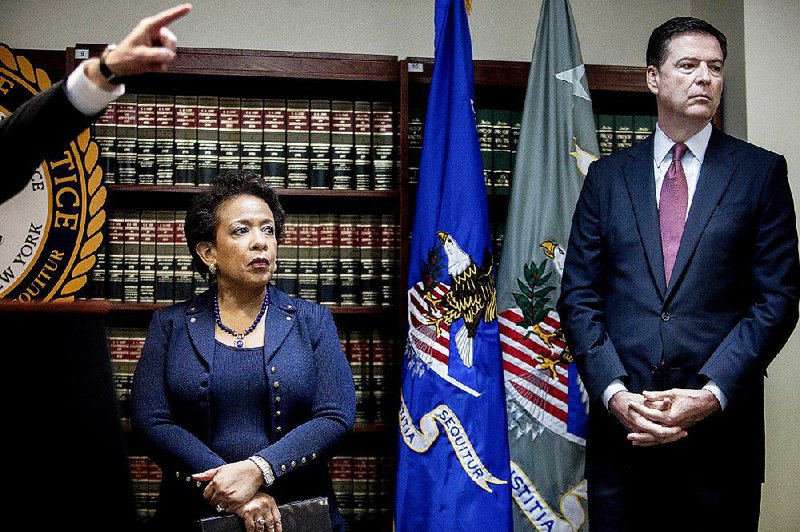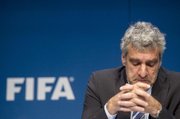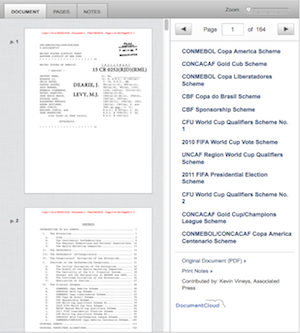ZURICH -- The U.S. government began an attack on what it called deep-seated and brazen corruption in soccer's global governing body, FIFA, on Wednesday, with authorities pulling the group's executives out of a luxury Swiss hotel to face racketeering charges and raiding regional offices in Miami.
Swiss officials entered FIFA headquarters in Zurich, seizing records and computers to investigate whether the decisions to award World Cup bids to Russia and Qatar were rigged.
Scandals and rumors of corruption have dogged FIFA, or the Federation Internationale de Football Association, throughout the 17-year reign of its president, Sepp Blatter, but he was not named in either investigation. He is scheduled Friday to stand for re-election to a fifth four-year term, and the organization said the vote would go ahead as planned.
FIFA also ruled out a revote of the World Cup bids won by Russia in 2018 and Qatar in 2022.
"We welcome the actions and the investigations by the U.S. and Swiss authorities and believe that it will help to reinforce measures that FIFA has already taken to root out any wrongdoing in football," Blatter said in a statement.
"This is a difficult time for football, the fans and for FIFA as an organization," he said. The organization said it was cooperating fully with the investigation.
Some of the biggest names in soccer said they had complained for years about corruption in FIFA, which oversees the sport and generates billions in revenue each year.
"I was treated like a crazy person," former soccer great Diego Maradona told radio station Radio La Red in Buenos Aires. "Now the FBI has told the truth."
Authorities conducted early morning raids in Zurich at FIFA headquarters and the five-star Baur au Lac Hotel. In Miami, FBI and IRS agents carried computers and boxes out of the headquarters of CONCACAF, the governing body of North and Central America and the Caribbean, whose past and current presidents were among defendants under indictment, accused of corruption.
The U.S. Justice Department indictment names 14 people on charges including racketeering, wire-fraud and money-laundering conspiracy. In addition to senior soccer officials, the indictment also named sports-marketing executives from the United States and South America who are accused of paying more than $150 million in bribes and kickbacks in exchange for media deals associated with major soccer tournaments.
Swiss police arrested seven soccer officials at the request of American prosecutors and threatened them with extradition to the U.S.
Two current FIFA vice presidents were among those arrested and indicted: Jeffrey Webb of the Cayman Islands and Eugenio Figueredo of Uruguay, the Justice Department said. The other soccer officials are Eduardo Li of Costa Rica, Julio Rocha of Nicaragua, Costas Takkas of Britain, Rafael Esquivel of Venezuela and Jose Maria Marin of Brazil.
All seven are connected with the regional confederations of North and South America and face up to 20 years in prison if convicted. FIFA suspended 11 people, including Webb and Figueredo, from all soccer-related activities after the U.S. announcement.
The Swiss Justice Ministry said six of the seven officials arrested oppose extradition to the United States, adding that U.S. authorities now have 40 days to submit the formal extradition request.
One of those detained, who was unidentified, agreed to "a simplified extradition procedure," meaning he can be sent to the U.S. in the coming days.
The others indicted were Jack Warner, a former FIFA vice president; Nicolas Leoz, a former FIFA executive committee member; Alejandro Burzaco, a sports-marketing executive based in Argentina; Aaron Davidson, president of Traffic Sports USA; Hugo and Mariano Jinkis, principals of Full Play Group, a sports-marketing business based in Argentina; and Jose Margulies, who ran two soccer broadcasting companies.
"Beginning in 1991, two generations of soccer officials ... used their positions of trust within their respective organizations to solicit bribes from sports marketers in exchange for the commercial rights to their soccer tournaments," U.S. Attorney General Loretta Lynch said at a news conference in New York. "They did this over and over, year after year, tournament after tournament."
Prosecutors also revealed four others had pleaded guilty in secret proceedings dating to July 2013. It's believed some or all are cooperating in the investigation.
They said the indictments represented only the beginning of their efforts. The indictment refers to 25 unnamed co-conspirators, from FIFA officials to a South Africa World Cup bid committee official.
Richard Weber, head of the IRS Criminal Division, called the case "the World Cup of fraud."
Stacks of Cash
In Florida, a small group of agents from the FBI and IRS executed search warrants at CONCACAF headquarters in Miami Beach.
CONCACAF reported itself to U.S. tax authorities in 2012. Then based in New York, the organization had not paid taxes over several years when its president was Warner and secretary-general was Chuck Blazer of the U.S., who was accused of failing to report more than $11 million in income.
Warner left soccer in 2011 to avoid FIFA sanctions in a bribery scandal during that year's presidential election. Blazer left in 2013 and has pleaded guilty to charges, the Justice Department said Wednesday.
Warner's successor as CONCACAF leader and FIFA vice president is Webb, who called himself a reformer when he was elected as CONCACAF president in 2012. Prosecutors alleged that part of the bribe money directed to Webb was transferred to the account of a contractor building a swimming pool at Webb's home in Loganville, Ga.
A dozen schemes were detailed in the indictment, including $10 million in payments from a FIFA account that ultimately benefited Warner after his 2004 vote for South Africa to host the 2010 World Cup. South Africa, with the backing of Nelson Mandela, beat rival bids from Morocco and Egypt to host that tournament.
Warner, of Trinidad and Tobago, surrendered to police in Port-of-Spain after they issued an arrest warrant at the request of U.S. authorities.
He was granted $395,000 bail but was expected to be held Wednesday night because of a processing delay. He did not enter a plea. Warner, who is an opposition member of Parliament in the nation, can be extradited to the U.S. under a bilateral treaty after a hearing.
"I have been afforded no due process and I have not even been questioned in this matter," he said in a statement. "I reiterate that I am innocent of any charges."
Warner's two sons, Daryan and Daryll, entered secret guilty pleas in 2013. The indictment points to their possible cooperation by detailing how, in a scheme to fix a vote awarding the 2010 World Cup tournament to South Africa, Warner directed an unnamed co-conspirator -- identified only as "a member of Warner's family" -- to fly to Paris to "accept a briefcase containing bundles of U.S. currency in $10,000 stacks in a hotel room from a high-ranking South African bid committee official."
The Justice Department cited bribes and kickbacks involving media rights deals for World Cup qualifying matches in the Caribbean and Central America, the Copa America -- South America's continental championship -- plus the CONCACAF Gold Cup and Champions League.
Prosecutors said CONMEBOL, the South American football association, reached an agreement in 2013 with a new company, Datisa, on a $240 million contract for rights to the Copa America in 2015, 2019 and 2023, and the following year to a $112.5 million deal for the 2016 Copa America Centenario in the U.S. As part of the deals, prosecutors said, Datisa agreed to pay $110 million in bribes to South American soccer officials.
Paruguay's Foreign Ministry said Wednesday that it had received an extradition request from the United States for Leoz, the former president of CONMEBOL. His lawyer said late Wednesday that his client was hospitalized for the flu but did not provide more details.
Swiss Probe bids
Meanwhile, Swiss prosecutors said they had "opened criminal proceedings" related to the awarding of the 2018 and 2022 editions in Russia and Qatar, respectively.
The Swiss prosecutors' office said the U.S. probe was separate from its investigation but that authorities were working together.
The votes to award the World Cups to Russia and Qatar have been surrounded in controversy and accusations of corruption. The two governments have denied any wrongdoing.
The Swiss prosecutors' office said in a statement it seized "electronic data and documents" at FIFA's headquarters Wednesday as part of the probe. Swiss police said they will question 10 FIFA executive committee members who took part in the World Cup votes in December 2010.
Qatar, a tiny Persian Gulf nation with little soccer tradition, was criticized from the start for its extreme summer heat. FIFA has since been forced to move the tournament to November-December instead of the usual June-July time slot.
FIFA awarded Qatar the right to host the tournament five years ago at a ceremony in Zurich, beating out Australia, Japan and South Korea, and the U.S.
Former President Bill Clinton served as the honorary chairman of the U.S. committee that worked to win the right to host the 2022 World Cup.
In 2010, Clinton attributed the decision to award the World Cup bid to Qatar to FIFA's desire to "make soccer a world sport."
The Qatari committee now planning the 2022 event has been revealed as a major donor to Clinton's charitable foundation. FIFA has also contributed to the Clinton Foundation, which has no involvement with the Justice Department's investigations.
The foundation's donor records, posted on its website, show FIFA has donated between $50,000 and $100,000 to the foundation. The Qatar 2022 Supreme Committee, which was formed in 2011 to build stadiums and other infrastructure, has given between $250,000 and $500,000 to the foundation.
FIFA also hired former U.S. Attorney Michael Garcia to investigate the 2018 and 2022 bid process. His findings were never fully released. Garcia's full report was turned over to Swiss authorities in November, prompting Wednesday's raid.
Russian Sports Minister Vitaly Mutko, who is also a FIFA executive committee member, said, "We've got nothing to hide." Qatari soccer officials declined to comment.
Nike, which is not a FIFA sponsor but pays to have the Brazilian and other countries' teams wear its gear, said it is cooperating with the U.S. investigation.
Though Nike was not referred to in the Justice Department indictment, a "multinational sportswear company headquartered in the United States" is mentioned with regard to bribery allegations involving Brazil.
Hundreds of soccer officials are in Switzerland for the FIFA congress, where Blatter is widely expected to win re-election.
European football's governing body, known as UEFA, said the election should be postponed and that it would consider boycotting the FIFA congress after the arrests. Early today, the chairman of the English Football Association, Greg Dyke, said Blatter should leave his job immediately.
But the 46-voter Asian Football Confederation said it opposed a delay and repeated its support for the 79-year-old president.
Blatter's only opponent in Friday's election, Prince Ali bin al-Hussein of Jordan, seized on the situation to push his candidacy.
"We cannot continue with the crisis in FIFA, a crisis that has been ongoing and is not just relevant to the events of today," the prince said in a statement.
Information for this article was contributed by Graham Dunbar, Rob Harris, Frank Jordans, Ronald Blum, Curt Anderson, Tom Hays, Jennifer Peltz, Eric Tucker, Tony Fraser and staff members of The Associated Press; by Matt Apuzzo, Stephanie Clifford, William K. Rashbaum, Michael S. Schmidt and Sam Borden of The New York Times; and by Nafeesa Syeed, Mohammed Aly Sergie, Robert Tuttle, Michael E. Miller, Fred Barbash and Rosalind Helderman of The Washington Post.
A Section on 05/28/2015


